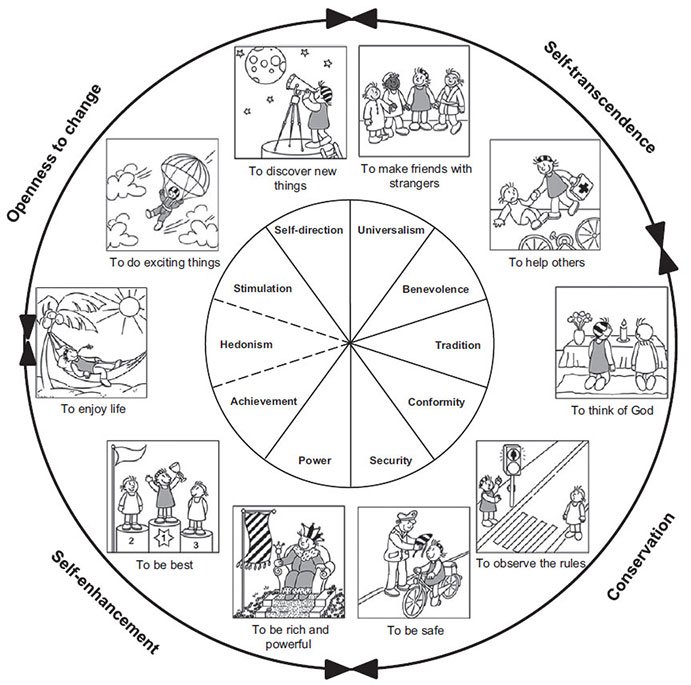As we grow up, we are influenced by our parents and society. Contradictory values tend to lead to conflict within ourselves or in society at large. For a society to maintain a semblance of cohesion, similar values should be maintained throughout that society. This requires that each generation transmit their values down to the next. But just because parents pass their values down to their children, doesn't mean those specific values will be the most successful.
What types of values are more successfully passed on?
How far does the apple fall from the tree?
How far does inheritance of values go?
Is it really "like father, like son"?
To answer these types of questions, psychologists made a collaborative study between Royal Holloway, University of London and the universities of Westminster, Vienna, and Bern. They assessed 418 families -- looking at the parent's and children's values -- to determine which types of values have the best chance of maintaining the value similarity between parents and children (which values are "passed-on").
There are two general categories of values parents instill as part of their psychological inheritance: (1) self-transcendence; (2) self-enhancement.
Self-Transcendence
Some parents endorse benevolence and universalism values of helping, supporting and caring for others, these would be considered more altruistic values. Researchers called these the values of self-transcendence, where we transcend focusing on ourselves alone and look to help others.
Self-Enhancement
While helping, supporting in caring for others might seem like obvious values to pass on, some parents live by opposing values of striving for power, achievement and following selfishness alone instead of adding more altruism. This is all about enhancing ourselves without much or any concern for others.

Schwartz’s model of values and exemplary items from the PBVS-C
Our value priorities indicate our value profile, like conservation values of tradition, conformity, and
security, or the opposing openness to change values of self-direction, stimulation,
and hedonism
The research suggests that parents who focus on self-transcendent prosocial values are likely more sensitive to their children's needs and establish stronger bonds through empathy and support. Children will identify more with the parents and be more likely to adopt the values that the parents instill in those children. This extends beyond self-transcendent values to include adopting values of being curious or adopting traditions that the parents engage in.
Children will take things "to heart", whether they are being nurtured with positive and supportive values, or influenced to be "the best" as part of the dominant interests of the parent. But when power and dominance are passed down, children don't have as much of a connection to the rest of their parents values. It seems that the identification between the child and parent is less strong and less welcoming of their other values, so the child does not or inherit as many values from the parent.
The end message of the researchers is that parents play a huge role in who we become through the development of our value system. Prosocial parents will essentially breed more prosocial children for the next generation, while selfish parents will less likely "breed" more selfishness into the next generation because the children will adopt less of the overall parental traits. Children of prosocial parents will want to adopt many of the overall values of their parents, while the children of power achieving dominant parents will not identify as much with the overall value profile of their parents.
What is your experience with inheriting values?
Were your parents prosocial and passed that on to you, or was it the opposite?
Are you an apple that didn't fall far from the tree? How much are you like your parents overall in all qualities?
Thank you for your time and attention. Peace.
References:
- Parents who want their children to be kind are the most successful in passing on all of their values
- Anna K. Döring et al. Parent-child value similarity in families with young children: The predictive power of prosocial educational goals, British Journal of Psychology (2017). DOI: 10.1111/bjop.12238
If you appreciate and value the content, please consider:
Upvoting  , Sharing
, Sharing  or Reblogging
or Reblogging  below.
below.
Please consider supporting me as a Steem Witness by voting for me at the bottom of the Witness page; or just click on the upvote button if I am in the top 50


